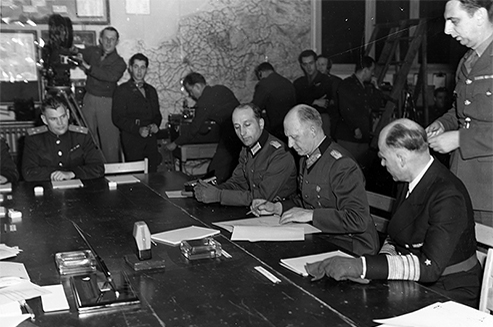On 30 April 1945, Adolf Hitler, before committing suicide, appointed Admiral Karl Dönitz as his successor. Even though this nomination had no formally legal effect, in practice it was up to Dönitz, as president of Germany and commander-in-chief of the Wehrmacht, to decide when to finally surrender.
Initially, Dönitz was not thinking about surrendering, but about an armistice on the Western Front while continuing fighting the Red Army. He wanted to gain time and to create conditions so that possibly the greatest number of German soldiers and civilians would find themselves on the territory occupied by Western Allies. Yet, events played out so fast that on 2 May Berlin surrendered and so did the German army in south Germany, Tirol, western Austria, Denmark, and the Netherlands three days later. Neither Dwight Eisenhower wanted to hear about a separatist peace and rejected German proposals.
As a result, on 7 May (at 2.41 am) at the headquarters of the Allied Expeditionary Force in the French city of Reims, the Act of Military Surrender was signed. On behalf of Germany, it was signed by (acting on authorisation of Dönitz) General Alfred Jodl and the German delegation also included Generals Wilhelm Oxenius and Hans-Georg von Friedeburg. On behalf of the Allies, the act was signed by US General Walter Bedell Smith and, as a witness, French General François Sevez. The Act of Military Surrender also carries the signature of Ivan Susloparov, who acted on behalf of the USSR.
Susloparov, informed by Western Allies about the planned signing of the act of surrender, immediately asked Moscow for instructions. However, no reply was sent, so the Soviet General fearing that the Soviet Union could be omitted from the Act of Military Surrender, decided to put his signature on the document. But Stalin had a different plan in mind. He recalled Susloparov to the USSR, demanded a repeat of the act of surrender and authorised Marshal Georgy Zhukov to place his signature on behalf of the USSR.
Since the document singed on 7 May provided for the possibility of signing a new “general” act, Western Allies agreed to sign another document. The ceremony had been planned for 8 May, but because of doubts about the participation of a representative of France, the signing was delayed until 22.43 hrs. On behalf of Germany it was signed by Wilhelm Keitel, Hans-Georg von Friedeburg and Hans-Jürgen Stumpff, while on behalf of Allies the act was signed by Georgy Zhukov (USSR), Artur Tedder (UK) and , as witnesses, Carl Andrew Spaatz (US) and Jean de Lattre de Tassigny (France).
It appears that Western Allies underestimated the propaganda effect of conquering Berlin and issues related to the signing of the act of surrender. Unlike Stalin who understood them very well and who would not accept the fact that the signing of the act of surrender was done in the territory of France. The act should be signed in Berlin that was conquered by the Red Army and a high ranking representative of the USSR should play a major role in it. Indeed, victory over fascism was to become an important element of Soviet policy in the years to come. In effect, the document signed on 7 May was called a “preliminary protocol of the surrender of the Third Reich” while the later document was considered officially binding. In addition the fact that the act of surrender was signed at 22.43 meant that according to Moscow time, the document was signed on 9 May at 00.43 hours. This has led to an odd situation, whereby in successive years Western countries commemorated the end of the war on 8 May, while in the USSR and its satellites, the victory over fascism was celebrated one day later.
In Poland, the issue was decided by decree of Bolesław Bierut dated 8 May 1945, which provided that “9 May, being the day of the end of military operations will constitute a National Holiday of Victory and Freedom.” In the Polish People’s Republic this initiative raised doubts – the act of surrender clearly carries the date 8 May and, in addition, it specifies that all active operations will cease on 8 May at 23.01 hours. Polish communist authorities tried to appease this dissonance by arguing that celebrations should be held on 9 May because it is the first day of freedom after the end of military operations.
Let us note that the signing of the act of surrender did not mean that military operations ceased automatically. In Europe the last German units surrendered as late as on 15 May (in Yugoslavia), while WWII finally ended with the surrender of Japan on 2 September 1945.
Author: Piotr Długołęcki, MFA Historian
For more about Poland and Poles in the Second World War visit a new website created by the Ministry of Foreign Affairs and the History Meeting House: Poland and Poles in the Second World War
Source: Press Office of the Ministry of Foreign Affairs Republic of Poland
Photo © Gen. Alfred Jodl, Chief of Staff of the German Army, signs the act of unconditional surrender, 7 May 1945/ Franklin D. Roosevelt Library Public Domain Photographs


